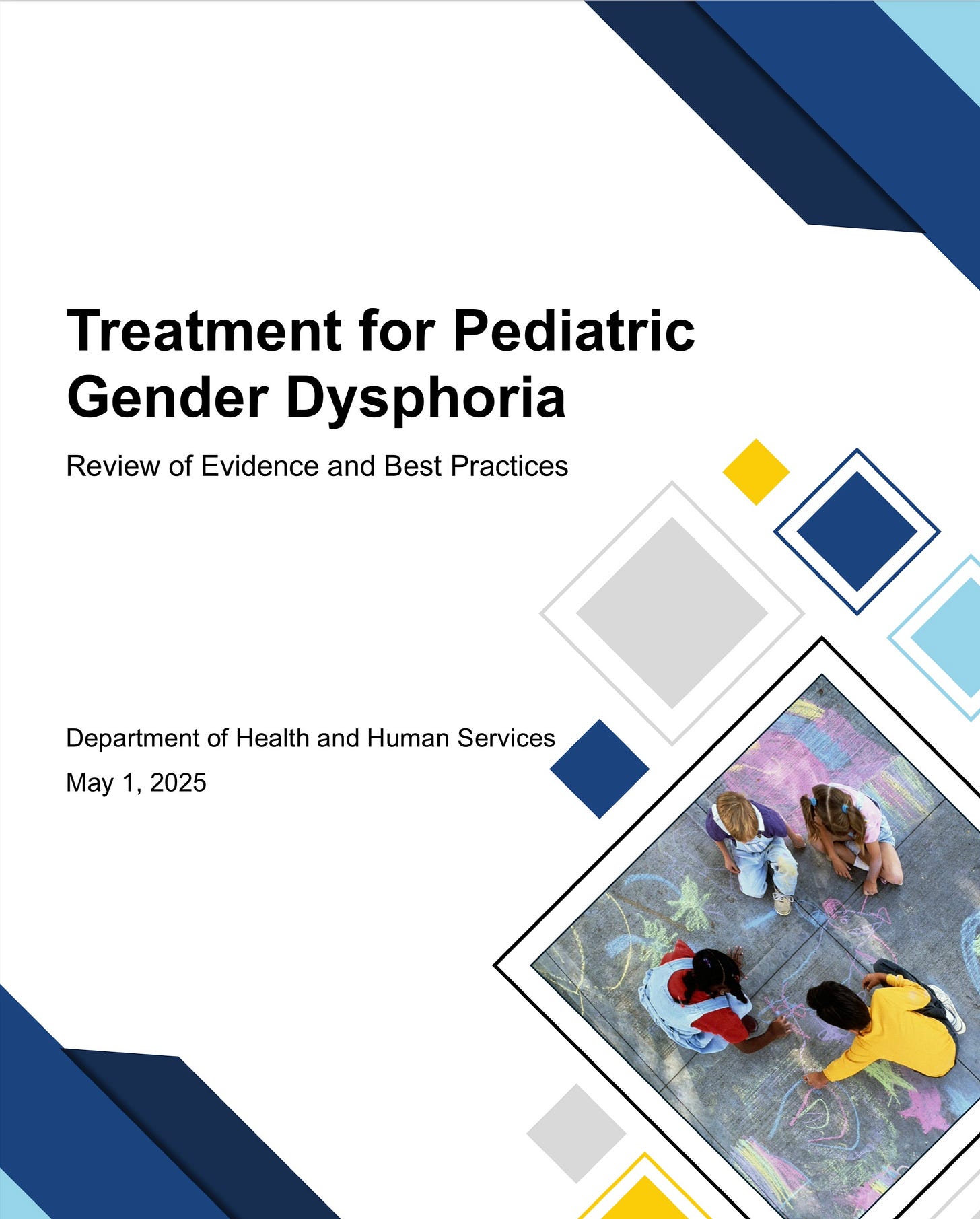HHS Releases “U.S. Cass Report”
And a string of dominoes tumble down.
On his first day in office, President Trump signed the executive order Protecting Children from Chemical and Surgical Mutilation. Part of the order was a charge to the Secretary of Health and Human Services (HHS) to publish, within 90 days, a “review of the existing literature on best practices for promoting the health of children who assert gender dysphoria or other identity-based confusion”. Since then, many people, especially PITT readers, have eagerly anticipated what has been dubbed the “U.S. Cass Report”. On Thursday May 1, the review was released. Intended for “policymakers, clinicians, therapists, medical organizations, and importantly patients and families,” it appears to be what many have hoped for - a serious, detailed review of evidence and best practices surrounding “gender affirming care”.
Writing for The Dispatch, journalist Jesse Singal calls the 409 page review “an important document that provides open-minded readers with a clear and nuanced overview of the debate.” He highlights the “overconfident advocates who have, for too long, pressured major institutions into prematurely accepting claims for the safety and efficacy of youth gender medicine” and acknowledges the “ugly campaigns to denigrate anyone who treats this issue as the scientific controversy it is.” The Manhattan Institute says the review is a “careful, rigorous, and sobering analysis.” In an excellent summary of the review on his Substack, Peter Sim writes that the “real value of the review is as a resource for reaching the leadership in the medical and mental health community who, up to now, have been willing to leave this matter in the hands of a small group of activists.” In UnHerd, Lisa Selin Davis describes it as “a comprehensive series of arguments about why the entire pediatric gender medicine industry should be dismantled.” An unnamed researcher expressed hope to The Economist that the review “could help provide a ‘golden bridge’ for the associations to retreat, admit they had been misled by WPATH, and change course.”
Within hours of the review’s release, the American Academy of Pediatrics released a statement, and, true to form and without a hint of irony, called it “inaccurate and misleading” claiming that it “prioritizes opinions over dispassionate reviews of evidence.” WPATH’s statement is equally absurd, claiming that the HHS review “misrepresents existing research and disregards the expertise of professionals.” You’d be hard pressed to think of a clearer example of DARVO (Deny, Attack, Reverse Victim and Offender - the manipulative tactic often used by perpetrators of abuse).
But the HHS review speaks for itself. And the days of people kowtowing to the “expertise” of activists in the AAP and WPATH are coming to an end, because these facts, and many others, stated explicitly in the review can no longer be denied:
The risks of pediatric medical transition include infertility/sterility, sexual dysfunction, impaired bone density accrual, adverse cognitive impacts, cardiovascular diseases and metabolic disorders, psychiatric disorders, surgical complications, and regret.
Guidelines for treatment published by WPATH and the Endocrine Society “lack developmental rigor and transparency.”
The gender-affirming model of care is characterized by a child-led process and the patient’s “embodiment goals.”
Whistleblowers and detransitioners are drawing public attention to risks and harms.
No independent association between gender dysphoria and suicidality has been found.
The true rate of regret is unknown.
Word choices such as “people” or “folks” obscure patients’ young ages and helps camouflage the fact that serious medical interventions are performed on children’s healthy bodies.
No tolerably clear definition of “gender identity” has been offered in the first place. This is a serious problem, because the term figures centrally in the justification for medical intervention.
There is no right to receive interventions that are not beneficial and the evidence for benefit of pediatric medical transition is very uncertain, while the evidence for harm is less uncertain.
When medical interventions pose unnecessary, disproportionate risks of harm, healthcare provider should refuse them even when they are preferred, requested, or demanded by patients.
Like a string of dominoes, the release of the review was followed quickly by news of a landmark legal victory following the plaintiffs’ decision to drop their challenge to Alabama’s Vulnerable Child Compassion and Protection Act, the State of Maine dropping its lawsuit against the Trump administration that was withholding federal funding while Maine allowed boys to compete in girls’ sports, and four U.S. Senators introducing a bill to ban federal funding for adult and pediatric gender transition procedures.
Whether the timing of these events was related to the release of the HHS review or just happenstance, no one can deny that it’s going to be hard for anyone to maintain the farce that children need healthy body parts chopped off to be happy, or that boys must be allowed to compete in girls’ sports, or that taxpayers need to fund “embodiment goal” cosmetic procedures.
We are witnessing the house of cards falling in real-time. I’m filled with a profound sense of relief and satisfaction, and I rejoice with every step toward the end this medical atrocity. But, in this PITT space especially, we must always acknowledge that for so many, this is all too little and too late.


The new administration has certainly delivered big-time on this issue and in the process has highlighted what some long-time liberals and/or Democrats may find a painful reality regarding the political and ideological divide in this country: as it relates to the Gender Cult, one Party is four-square on the side of Evil and the other Party...isn't.
Please, send some common sense to Australia, we're always the last to the party!! And yes, it's a wonderful change of tack but too late for all the children who what been harmed and for the families that have been broken 😢